AI SEO For Shopify Stores: Best Practices Every Merchant Needs in 2025
If you’re a Shopify merchant, you already know how tough it can be to rank high on search engines.
With rising competition and constant algorithm updates, managing SEO can quickly become exhausting for Shopify merchants. AI SEO for Shopify stores changes that by automating keyword research, content creation, and technical optimization, helping you work smarter, not harder.
By leveraging advanced AI SEO tools, you can streamline repetitive tasks, optimize product pages with precision, improve keyword rankings, and drive steady organic traffic, all without endless trial and error.
You can analyze trends, forecast which products and keywords will perform best, and stay ahead of competitors, ensuring your store is fully optimized for maximum visibility and sales.
Read this blog to discover how AI SEO for Shopify can simplify your SEO tasks, boost organic traffic, and optimize product pages.
What is AI SEO for Shopify, and why is it Important for Shopify stores?
“AI SEO” (or AI for SEO) refers to applying artificial intelligence, especially large language models (LLMs), natural language processing (NLP), and automation, to optimize websites and content for search.
Rather than relying purely on human-driven keyword stuffing, manual audits, and guesswork, AI SEO methods help:
- Generate content ideas and outlines
- Suggest keyword targeting or topic clusters
- Optimize existing pages (e.g., meta tags, internal links)
- Automate repetitive SEO tasks
- Predict keyword trends and ranking shifts
For Shopify marketers, where you typically manage hundreds or thousands of product pages and blog posts, AI SEO can scale your efforts and help your store compete in ever-tighter SERPs.
Plus, as generative AI becomes tied into search engines (for example, Google’s Search Generative Experience or AI-powered answer engines), what counts as “visibility” is evolving.
You may not always rank 1st on a traditional SERP, but your content could be surfaced directly in AI-driven search results (a shift sometimes called Answer Engine Optimization (AEO) or Generative Engine Optimization (GEO).
Thus, Shopify merchants must blend classic SEO with new AI-aware strategies.
Core Pillars of AI SEO for Shopify Stores
Below are the key dimensions you should optimize when applying AI SEO for Shopify stores.
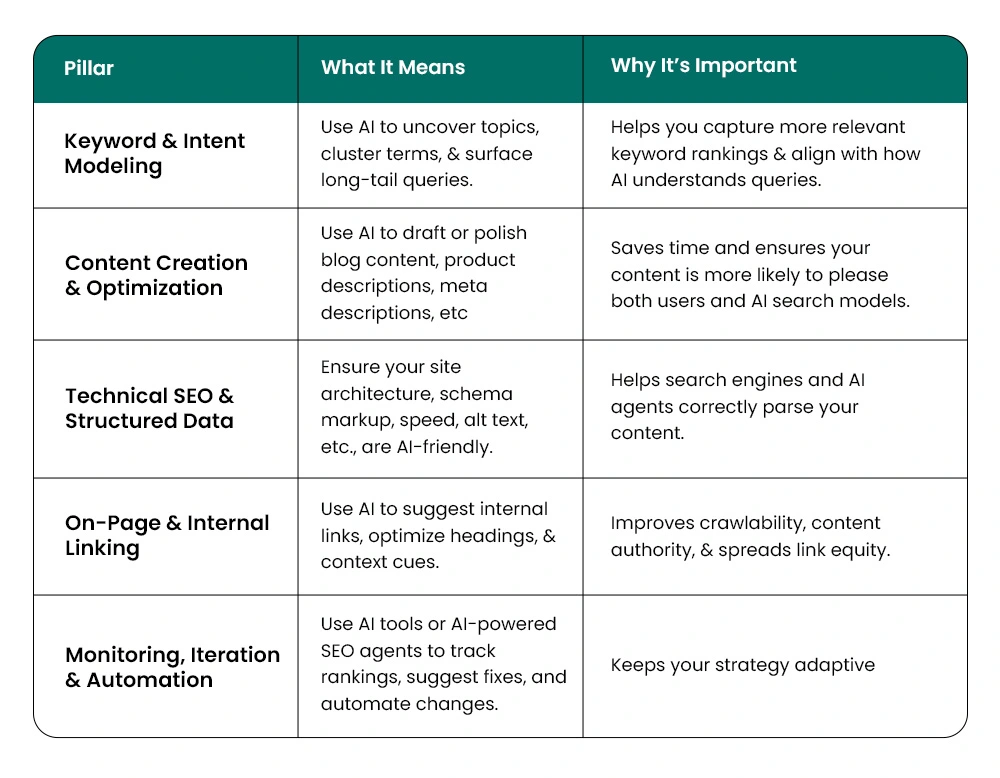
How Does AI-Powered SEO Improve Shopify Rankings?
AI doesn’t just guess what works; it analyzes massive datasets to identify the most effective SEO strategies. Shopify merchants can use AI to:
- Detect opportunities in keyword research, including high-conversion long-tail phrases
- Optimize blog posts, product descriptions, meta descriptions, and alt text
- Audit and fix technical SEO issues like broken links, duplicate content, and slow-loading pages
- Automate structured data to make products more visible in rich snippets and search results
- Predict trending products, search terms, and customer behavior for better content planning
A leading financial website, Bankrate.com, used AI to create expert-reviewed financial articles and meta tags, publishing over 160 pieces in six months. Many now rank on Google’s first page, driving around 125,000 monthly organic visitors. (Source)
Their success shows that well-edited AI content can perform as well as human-written work in search results, making it a crucial strategy for AI SEO for Shopify stores.
Can AI Automatically Optimize my Product Pages?
Yes! Shopify AI SEO tools like Shopify Magic, Jasper, and other AI-powered SEO agents can help you automatically create keyword-optimized product descriptions, meta descriptions, and alt text.
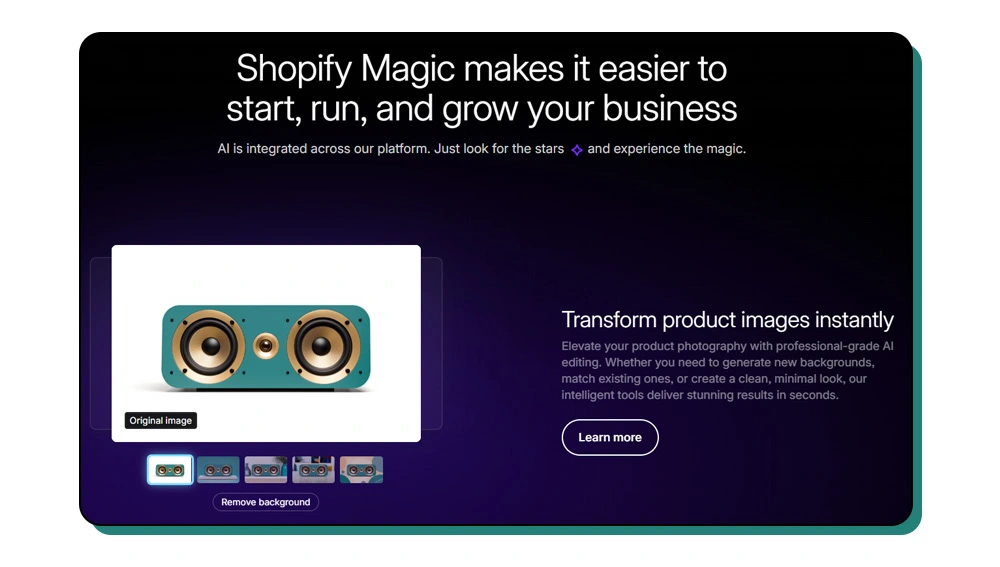
AI also applies structured data, making your product pages more visible in search results and improving AI SEO optimization.
Steps for Product Page Optimization:
- Generate keyword-rich, conversion-focused product descriptions
- Create descriptive alt text for all product images
- Add structured data for rich snippets in search results
- Test and refine meta titles and meta descriptions to improve click-through rates
- Monitor and adjust page content based on AI insights for better SEO performance
Bonus Tip: Use conversational, natural phrasing in product descriptions to boost rankings in voice search and AI-powered search results with AI SEO for Shopify.
What SEO Tasks Can AI Handle for Shopify Stores?
AI can manage almost all SEO tasks for Shopify merchants, making SEO AI more efficient and results-driven:
1. Keyword Research
Identify high-conversion long-tail keywords, trending search terms, and high-traffic phrases specific to your niche
2. Content Creation
Generate engaging blog posts, FAQs, product descriptions, and meta descriptions optimized for search engines
3. Technical SEO
Detect broken links, duplicate content, missing meta tags, slow-loading pages, and structured data issues
4. Competitor Analysis
Track competitors’ keyword rankings and content strategies to refine your SEO approach
5. Predictive Analytics
Forecast seasonal trends, high-demand products, and emerging keywords to optimize content ahead of time
A study by Caseo.AI analyzed Shopify stores using AI-generated alt text and found:
- 35% improvement in image search rankings
- 22% increase in organic traffic
These enhancements contribute to better visibility and user engagement.
How do AI-Powered SEO Agents Improve Keyword Research?
AI SEO agents make keyword research smarter and faster for Shopify merchants by analyzing data at scale:
- Suggest High-Performing Keywords: Identify primary, secondary, and semantic keywords for content optimization
- Recommend Long-Tail Keywords: Capture buyer intent with precise, niche-specific phrases
- Rank Keywords: Evaluate search volume, difficulty, and conversion potential for smarter targeting
- Analyze Competitor Keywords: Discover what’s working for competitors and adapt strategies accordingly
AI differentiates between generic terms like “running shoes” and intent-driven queries like “best cushioned running shoes for beginners,” helping Shopify merchants attract highly motivated buyers.
Pro Tip: Always review AI keyword suggestions to ensure they align with your brand, audience, and AI SEO for Shopify strategy.
How Can AI Help with Content Creation for Shopify SEO?
High-quality content is the backbone of Shopify SEO, and AI makes creating it faster and smarter.
Generative AI tools help Shopify merchants draft blogs, product descriptions, FAQs, meta descriptions, and more, all optimized for search engines and user experience.
Best Practices:
- Start with AI Drafts: Let AI create first drafts, then refine for your unique brand voice
- Include Semantic Keywords: Use phrases like content optimization, organic traffic, alt text, product pages, and blog posts to improve SEO relevance
- Optimize for Voice Search: Incorporate natural, conversational phrasing to capture voice-activated queries
- Enhance Readability & Engagement: AI can suggest tone, structure, and formatting improvements for higher user engagement
68% report an increase in content marketing ROI directly attributable to AI. Combine AI efficiency with human creativity to ensure content resonates with your audience while maintaining Shopify AI SEO standards.
Can AI Optimize Technical SEO for Shopify?
Absolutely! AI-powered SEO agents can perform detailed site audits, identify issues, and suggest actionable fixes to improve your Shopify store’s visibility in search results.
From broken links to structured data errors, AI SEO for Shopify handles technical SEO so merchants can focus on growth.
Common Technical SEO Issues AI Can Fix:
- Broken links and 404 errors
- Duplicate content across product pages and blogs
- Missing or weak meta descriptions
- Missing structured data for rich snippets
- Slow-loading pages and other site performance issues
AI Tools for Technical SEO:
- Alli AI: Automates bulk on-page SEO updates and canonical tags
- Screpy: Suggests technical improvements for site speed and overall SEO optimization
- Shopify Magic: Optimizes structured data, alt text, FAQs, and meta tags
A mid-sized Shopify electronics store implemented structured data markup using AI tools. Within four months, organic traffic increased by 67%, click-through rates improved by 89%, and more product pages appeared in rich snippets on Google, enhancing visibility and boosting overall SEO performance.
Pro Tip: Regular AI-powered technical audits ensure your Shopify store stays optimized as search engine algorithms evolve.
How Does AI SEO Help with Voice and Visual Search?
With voice assistants and visual search becoming more common, Shopify merchants must optimize content to stay visible. AI-powered SEO agents make it easy to capture these new traffic sources by enhancing product pages, blog content, and image assets for search engines.
Ways AI Supports Voice and Visual Search:
-
- Suggests conversational keywords for natural voice search queries
- Generates descriptive alt text for product images and visuals
- Applies structured data to enable rich snippets and improve search visibility
Pro Tip: Focus on natural, conversational phrases in product descriptions and blogs to improve both voice and visual search performance.
Which AI SEO Tools are Best for Shopify?
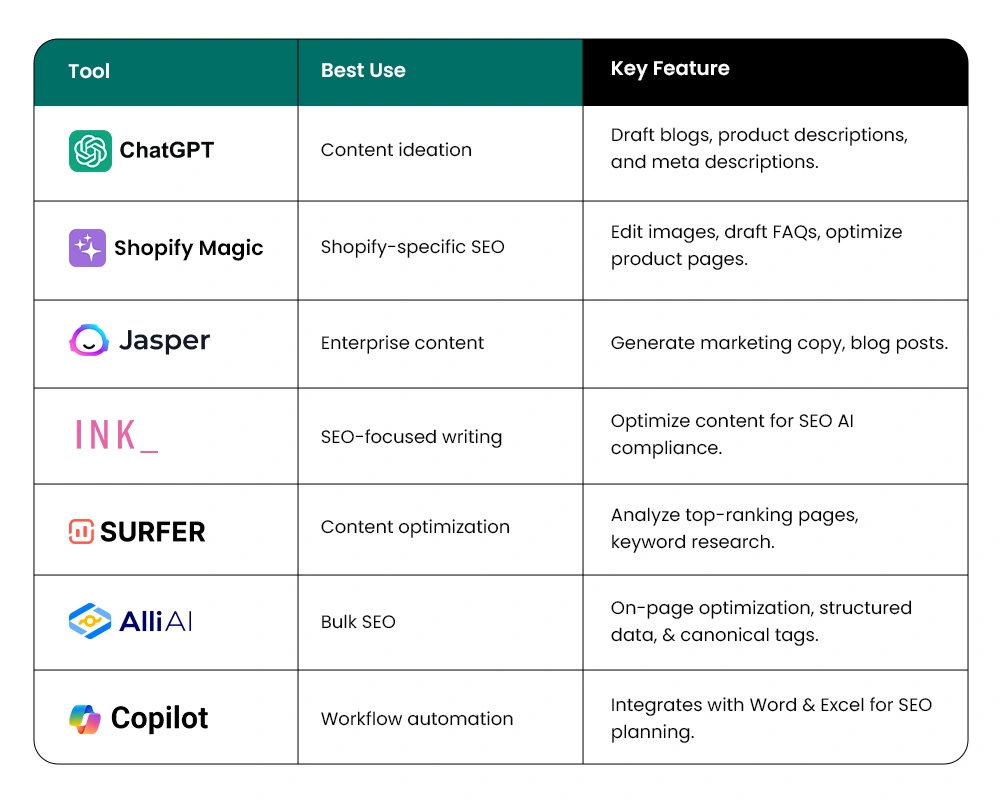
How Do Shopify Merchants Integrate AI into Their SEO Strategy?
Integrating AI SEO for Shopify isn’t complicated; it’s about using the right mix of smart tools and consistent optimization.
Whether you’re a new merchant or running a growing Shopify store, AI can streamline everything from keyword research to technical SEO fixes and performance tracking.
Step-by-Step AI SEO Framework for Shopify Merchants:
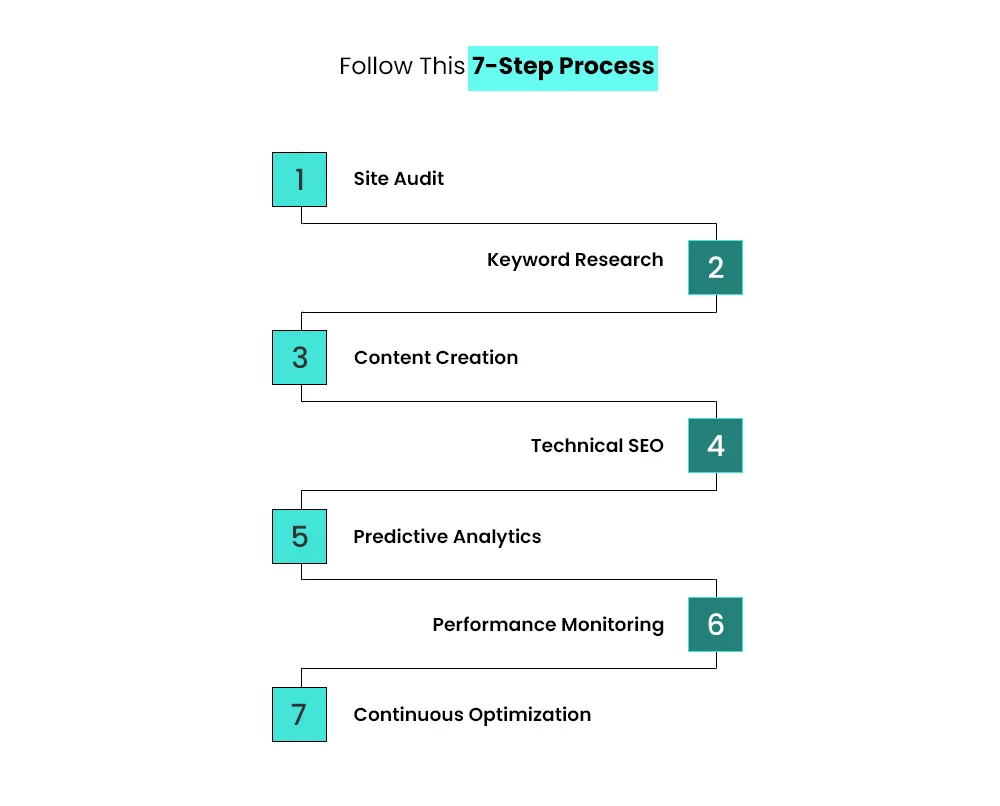
1. AI-Powered Site Audit
Utilize AI SEO tools to identify technical SEO issues, such as broken links, missing meta descriptions, and duplicate content. Then optimize your product pages for speed and usability.
2. Find the Right Keywords
Let AI for SEO identify high-performing, long-tail, and semantic keywords tailored to your niche, helping you capture more organic traffic.
3. Create SEO-Friendly Content with AI
Use generative AI to draft SEO-rich product descriptions, FAQs, blog posts, and meta descriptions, ensuring consistent content optimization.
4. Enhance Technical SEO with Intelligent Automation
Apply structured data, alt text, and meta tags to improve search results visibility and enhance your store’s SEO strategies.
5. Predictive SEO Insights with AI Analytics
Leverage AI SEO optimization tools to forecast seasonal trends, customer behavior, and product demand before they peak.
6. Real-Time Performance Tracking
Track keyword rankings, website traffic, and conversions using AI-powered analytics dashboards for actionable insights.
7. Continuous AI Optimization for Higher Rankings
Get AI-generated improvement suggestions to refine content, fix errors, and boost visibility over time.
Treat your AI as a co-pilot, not a replacement. Combine AI-driven insights with your creative expertise to build SEO strategies that truly connect with your customers and boost long-term performance.
How Can AI Help Generate FAQs and Meta Descriptions?
AI SEO makes it easy to create FAQs and meta descriptions that improve search results visibility and click-through rates.
By utilizing tools like ChatGPT, Shopify Magic, and Jasper, merchants can save time while maintaining content that is optimized for voice search, AI queries, and user intent.
How AI Supports FAQ & Meta Description Creation?
- Write compelling meta descriptions: Craft keyword-rich meta descriptions that increase CTR and improve SEO AI performance.
- Generate FAQs for voice and AI search: Automatically create question lists tailored to your product pages and blog content.
- Draft conversational FAQs: Ensure content matches the tone your customers expect while optimizing for generative AI and semantic keywords.
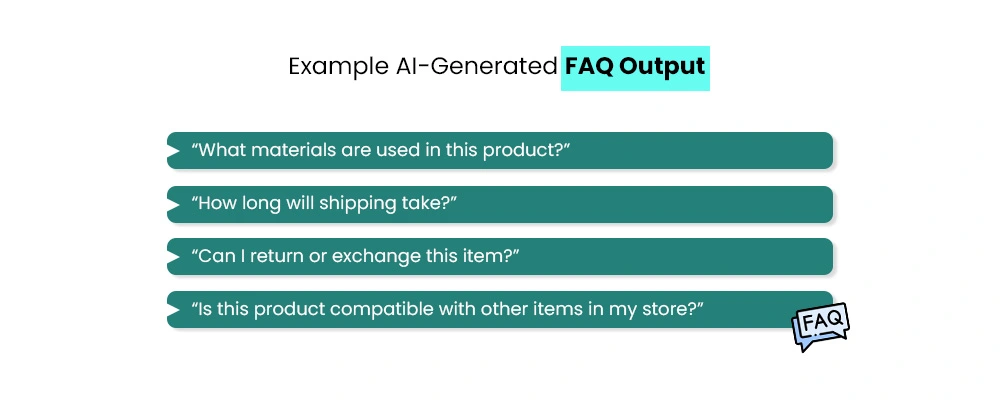
Pro Tip: Use AI suggestions as a foundation, then refine them to match your brand’s voice. This ensures AI SEO optimization while keeping your content engaging and search engine-friendly.
Best Practices Checklist: AI SEO for Shopify in 2025
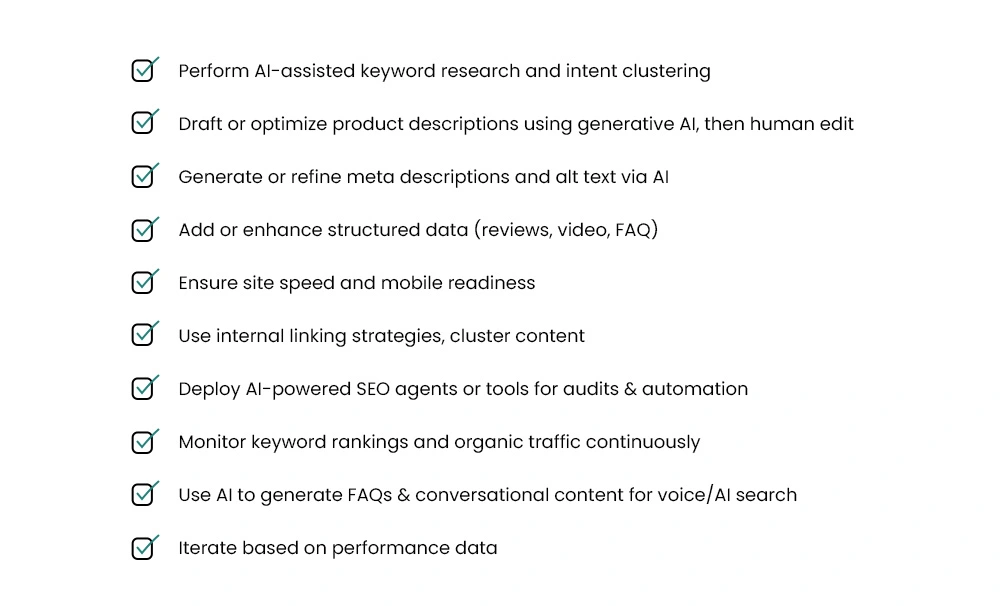
What are the Benefits of AI SEO Optimization for Shopify Merchants?
AI SEO for Shopify helps merchants streamline their SEO strategy, improve rankings, and drive more organic traffic.
By using AI for SEO and Shopify AI SEO tools, store owners can save time, optimize content, and stay ahead of competitors.
Key Benefits of AI SEO Optimization:
1. Save Time
Automate content creation, product descriptions, meta descriptions, alt text, and technical SEO tasks.
2. Increase Visibility
Appear in rich snippets, voice search, and visual search results to capture new traffic sources.
3. Improve Keyword Rankings
Target high-conversion long-tail and semantic keywords for better search results positioning.
4. Boost Conversions
Optimized product pages, meta descriptions, and structured data increase CTR and sales.
5. Predict Trends
Forecast seasonal product demand and trending search terms using AI SEO tools.
AI automates 44.1% of key SEO tasks, including content creation and keyword research, boosting efficiency for users.
Can AI Replace Human SEO Experts Completely?
While AI for SEO can automate many tasks like technical SEO, keyword research, and content drafts, it cannot fully replace human expertise. Shopify merchants still need humans for:
- Brand Voice Refinement: Ensuring content reflects your store’s unique style and personality.
- Strategy Decisions: Choosing which products, keywords, and campaigns to prioritize.
- Accuracy and Context: Verifying AI outputs for factual correctness and relevance to your audience.
Best Approach: Use AI SEO optimization to handle repetitive SEO tasks, while humans guide strategy, review content, and fine-tune outputs for maximum impact on organic traffic and conversions.
Top Tips for Shopify AI SEO Success
To make the most of Shopify AI SEO, follow these practical tips:
-
Leverage AI SEO Tools
Use AI for first drafts, product descriptions, blog posts, and technical audits.
-
Vet AI Suggestions
Ensure keywords, content, and recommendations align with your target audience and brand voice.
-
Optimize for Voice & Visual Search
Include conversational keywords and descriptive alt text for better reach.
-
Focus on On-Page Essentials
Implement structured data, meta descriptions, alt text, and internal linking to boost visibility in search results.
-
Monitor & Adjust
Track keyword rankings, traffic, and conversions using AI analytics, and tweak your SEO strategies for continuous improvement.
Advanced Thoughts & Pitfalls to Watch
As AI SEO for Shopify continues to evolve, it’s important to stay mindful of how these tools are used. Automation can save time and boost performance, but without the right checks, it can also create new challenges.
Here are a few advanced considerations and pitfalls to watch out for.
1. Avoid “Over-Automation” Without Oversight
While AI tools are powerful, they can make mistakes (unnatural phrasing, keyword stuffing, factual errors). Always review outputs.
2. Beware of Content Redundancy and Duplication
AI might inadvertently generate very similar content across products; canonicalization becomes more critical.
3. AI Models Evolve — Stay Updated
What works in 2025 (e.g., structure cues, prompt formats) might shift as large language models (LLMs) change.
4. Manipulation Risks in LLM-Driven Search
Some research shows that inserting strategic sequences in your content can influence ranking in generative AI responses, but this raises fairness and ethical questions
5. Privacy & Data Ethics
If your AI tools ingest customer or behavioral data, ensure compliance with data privacy laws and transparency.
6. Don’t Neglect Branding/Voice
AI output should still reflect your brand tone, unique value, and differentiators.
7. Over-Reliance on AI vs Domain Expertise
For highly technical or niche categories, domain knowledge is irreplaceable.
Conclusion: Take Your Shopify SEO to the Next Level with AI
AI SEO for Shopify is essential for merchants who want to improve their store’s visibility, organic traffic, and sales. Throughout this blog, we’ve explored how AI can help Shopify merchants:
- Automate SEO tasks like keyword research, content creation, and technical audits.
- Optimize product pages, blog posts, and FAQs for better keyword rankings and richer search results.
- Leverage predictive analytics to forecast trending products and search terms.
- Enhance voice and visual search performance through conversational keywords, alt text, and structured data.
By combining AI tools with human expertise, Shopify stores can maintain accuracy, align with brand voice, and continuously refine SEO strategies.
For merchants looking for professional support, Mastroke, a leading Shopify marketing and AI SEO agency, can help implement AI SEO effectively, optimize content, and improve overall store performance.
Book a call with us today to start enhancing your Shopify store’s SEO and maximize traffic, conversions, and sales.
Frequently Asked Questions (FAQs)
1. What is the best AI SEO app for Shopify?
Top apps include Shopify Magic, Jasper, Surfer SEO, and Alli AI, which help automate keyword research, optimize content, and improve organic traffic.
2. Can I do SEO for a Shopify store?
Yes. You can optimize product pages, blogs, meta descriptions, alt text, and structured data. AI tools make this faster and easier.
3. Does Shopify allow AI?
Yes. Shopify supports AI tools like Shopify Magic to help merchants optimize SEO and improve store performance.
4. What is AI SEO for Shopify stores?
It’s using AI to optimize your store’s pages, blogs, and products. Tools leverage NLP and LLMs to automate keyword research, content creation, and technical SEO.
5. How does AI help improve SEO for my Shopify store?
AI identifies high-performing keywords, optimizes product pages and blogs, fixes technical issues, and predicts trending products to boost organic traffic.
6. Can AI SEO increase my Shopify sales?
Yes. Better keyword rankings, optimized content, and improved product pages drive more traffic and higher conversions.
7. Do I need technical skills to use AI SEO for Shopify?
Not really. Tools like Shopify Magic and Jasper are user-friendly and guide you through optimization without coding.
8. Can AI SEO optimize my Shopify store for voice search?
Yes. AI suggests conversational keywords, optimizes product descriptions, and creates FAQs tailored for voice search queries.